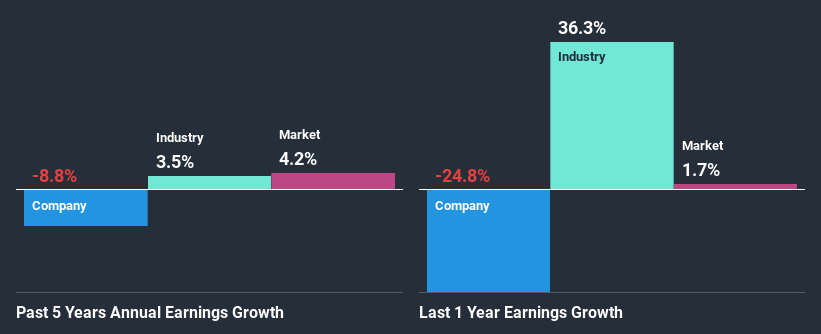- South Korea
- /
- Food
- /
- KOSDAQ:A189980
Hyung Kuk F&B Co., Ltd.'s (KOSDAQ:189980) Stock Is Rallying But Financials Look Ambiguous: Will The Momentum Continue?
Hyung Kuk F&B (KOSDAQ:189980) has had a great run on the share market with its stock up by a significant 30% over the last three months. However, we wonder if the company's inconsistent financials would have any adverse impact on the current share price momentum. Particularly, we will be paying attention to Hyung Kuk F&B's ROE today.
Return on equity or ROE is an important factor to be considered by a shareholder because it tells them how effectively their capital is being reinvested. In other words, it is a profitability ratio which measures the rate of return on the capital provided by the company's shareholders.
Check out our latest analysis for Hyung Kuk F&B
How To Calculate Return On Equity?
The formula for return on equity is:
Return on Equity = Net Profit (from continuing operations) ÷ Shareholders' Equity
So, based on the above formula, the ROE for Hyung Kuk F&B is:
4.7% = ₩3.1b ÷ ₩66b (Based on the trailing twelve months to September 2020).
The 'return' refers to a company's earnings over the last year. So, this means that for every ₩1 of its shareholder's investments, the company generates a profit of ₩0.05.
Why Is ROE Important For Earnings Growth?
We have already established that ROE serves as an efficient profit-generating gauge for a company's future earnings. Depending on how much of these profits the company reinvests or "retains", and how effectively it does so, we are then able to assess a company’s earnings growth potential. Generally speaking, other things being equal, firms with a high return on equity and profit retention, have a higher growth rate than firms that don’t share these attributes.
Hyung Kuk F&B's Earnings Growth And 4.7% ROE
It is hard to argue that Hyung Kuk F&B's ROE is much good in and of itself. Even compared to the average industry ROE of 6.5%, the company's ROE is quite dismal. Given the circumstances, the significant decline in net income by 8.8% seen by Hyung Kuk F&B over the last five years is not surprising. We reckon that there could also be other factors at play here. Such as - low earnings retention or poor allocation of capital.
So, as a next step, we compared Hyung Kuk F&B's performance against the industry and were disappointed to discover that while the company has been shrinking its earnings, the industry has been growing its earnings at a rate of 3.5% in the same period.

Earnings growth is an important metric to consider when valuing a stock. The investor should try to establish if the expected growth or decline in earnings, whichever the case may be, is priced in. This then helps them determine if the stock is placed for a bright or bleak future. If you're wondering about Hyung Kuk F&B's's valuation, check out this gauge of its price-to-earnings ratio, as compared to its industry.
Is Hyung Kuk F&B Making Efficient Use Of Its Profits?
Hyung Kuk F&B's low three-year median payout ratio of 23% (or a retention ratio of 77%) over the last three years should mean that the company is retaining most of its earnings to fuel its growth but the company's earnings have actually shrunk. This typically shouldn't be the case when a company is retaining most of its earnings. So there might be other factors at play here which could potentially be hampering growth. For instance, the business has faced some headwinds.
Additionally, Hyung Kuk F&B started paying a dividend only recently. So it looks like the management may have perceived that shareholders favor dividends even though earnings have been in decline.
Conclusion
Overall, we have mixed feelings about Hyung Kuk F&B. While the company does have a high rate of reinvestment, the low ROE means that all that reinvestment is not reaping any benefit to its investors, and moreover, its having a negative impact on the earnings growth. Wrapping up, we would proceed with caution with this company and one way of doing that would be to look at the risk profile of the business. Our risks dashboard would have the 6 risks we have identified for Hyung Kuk F&B.
If you’re looking to trade Hyung Kuk F&B, open an account with the lowest-cost* platform trusted by professionals, Interactive Brokers. Their clients from over 200 countries and territories trade stocks, options, futures, forex, bonds and funds worldwide from a single integrated account. Promoted
Valuation is complex, but we're here to simplify it.
Discover if HYUNGKUK F&B might be undervalued or overvalued with our detailed analysis, featuring fair value estimates, potential risks, dividends, insider trades, and its financial condition.
Access Free AnalysisThis article by Simply Wall St is general in nature. It does not constitute a recommendation to buy or sell any stock, and does not take account of your objectives, or your financial situation. We aim to bring you long-term focused analysis driven by fundamental data. Note that our analysis may not factor in the latest price-sensitive company announcements or qualitative material. Simply Wall St has no position in any stocks mentioned.
*Interactive Brokers Rated Lowest Cost Broker by StockBrokers.com Annual Online Review 2020
Have feedback on this article? Concerned about the content? Get in touch with us directly. Alternatively, email editorial-team (at) simplywallst.com.
About KOSDAQ:A189980
HYUNGKUK F&B
Engages in the manufacture and sale of foods and beverages in South Korea.
Slight risk with mediocre balance sheet.
Market Insights
Community Narratives



